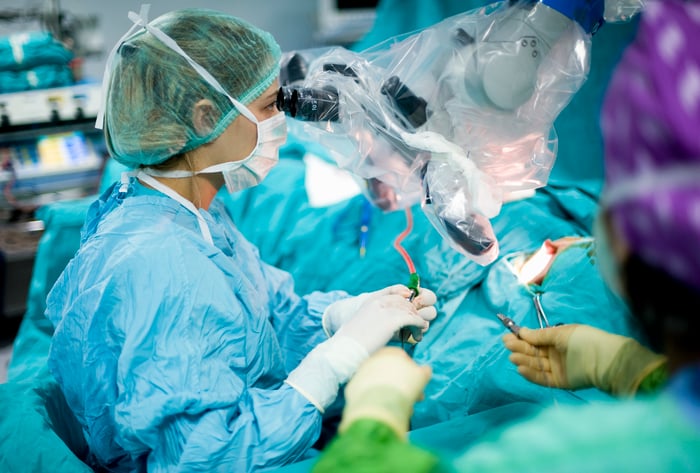Artificial intelligence (AI) is becoming one of the key technologies unlocking innovation across industries. Few companies have embraced it as much as electric vehicle manufacturer Tesla (TSLA -3.55%). From the beginning, Tesla realized electric cars would be game-changers. But perhaps its biggest opportunity rests in using AI to enhance every aspect of vehicle performance -- including the eventual goal of creating a fully self-driving car. Eventually, though maybe not as soon as Elon Musk would like, fleets of AI-driven Tesla robotaxis could dramatically improve the cost and safety of driving.
Similarly, Intuitive Surgical (ISRG -0.41%) has realized the effect AI could have on its da Vinci and Ion surgical robot business. In October 2020, Intuitive launched a $100 million venture capital fund to invest in companies accelerating the future of minimally invasive care. Investing in the combination of AI and surgical robots has the potential to create better outcomes, fewer complications, shorter hospital stays, faster recoveries, and lower total costs.
Although the automotive and healthcare industries may seem worlds apart, they both stand to benefit greatly from innovations in AI and robotics.

Image source: Getty Images.
Intuitive's AI investments
Intuitive Surgical's initial investment was in Kela Health, an AI company focused on precision surgery. Kela Health uses patient-specific predictive insights and risk stratification to help improve surgical quality. Studies have shown AI models enabled reductions in the cost and complications of certain surgeries by 40% to 50%. These kinds of benefits are hugely important to Intuitive's hospital clients, who are under pressure to improve the cost and quality of their surgical service lines.
Intuitive's AI investment seems smart on several fronts. First, it helps advance the best thinking in minimally invasive care, which strengthens Intuitive's core value proposition. Second, it expands Intuitive's value proposition by fostering improvements in the end-to-end surgical process, from pre-surgery planning through post-surgery follow-up. Finally, it enables Intuitive to drive down the total cost of surgery for its customers without reducing its own revenue or margins.
Are robots replacing doctors?
Hardly a day goes by without a new headline about Tesla owners driving hands-free, jumping into the backseat, or even sleeping while driving. It's natural to wonder if embracing AI means Intuitive robots will be replacing doctors and driving themselves anytime soon.
The short answer is probably "no." Intuitive already uses an impressive amount of data and analytics to help surgeons assess and improve their outcomes. AI will serve to deepen this effort to help doctors improve their own decision-making and sharpen their skills.
Many early uses of AI are focused on pre-surgical planning, a process in which data from many different sources can be combined to help healthcare providers and patients make better choices. For example, a patient preparing for surgery may be tracking their weight, meals, and exercise through applications and fitness trackers. All of this data, plus information from their medical record, can be collected and analyzed by AI models to identify high-risk patients and generate valuable predictions for postoperative care.
In the same way, AI has the potential to help surgeons augment their decision-making and skills during an operation. AI models can perform real-time analysis of operation video, patient vital signs, and instrument and hand tracking to monitor the procedure and make recommendations to avoid adverse events. Although it's still early days, the combination of well-trained and experienced surgeons, robots, and AI could lead to better surgical outcomes.
Widening an already impressive competitive moat
AI models continually learn and improve as they process more data. Companies with access to so-called "big data" can develop better models, generate more insights, and improve predictive value faster and better than companies with limited data sets.
Despite looming competition from other car companies, Tesla's lead in having more cars on the road collecting more data for its AI models is a significant advantage that widens every day. Similarly, with a large installed base of more than 6,000 da Vinci robots and a run rate of more than 1.2 million annual procedures, Intuitive can use AI to enhance its already large competitive moat. Competitors having to go through a multi-year U.S. Food and Drug Administration (FDA) approval process before selling into hospitals will find themselves hard-pressed to match Intuitive's level of AI data-driven performance and value.
Intuitive has carved out an impressive position in the healthcare industry, and has been a solid investment, outperforming the S&P 500 (290% versus 100%) over the last five years. By taking a page out of Tesla's playbook, the combination of robots and AI could put Intuitive on a path of continued industry leadership and outsized returns for years to come.





